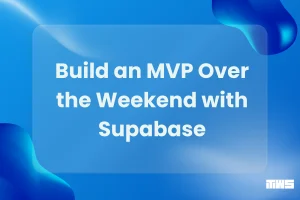
Table of Content
As businesses scale their products and teams, the need for stable, efficient, and fast-moving infrastructure becomes hard to ignore. That’s where DevOps engineers come in. Acting as a bridge between development and operations, DevOps professionals help companies automate processes, speed up releases, and maintain system reliability — all essential for staying competitive in today’s market.
But hiring the right DevOps engineer can feel overwhelming, especially if you’re not sure what skills to prioritize or where to look. In this guide, we’ll walk through everything you need to know to make smart, confident hiring decisions — from understanding the role to evaluating candidates and setting up a successful collaboration.
What Does a DevOps Engineer Do?
DevOps engineers play a critical role in unifying software development and IT operations. Their main focus is to build systems that allow for faster development cycles, stable releases, and efficient infrastructure management.
Here are some of the key responsibilities of a DevOps engineer:
- Building and maintaining CI/CD pipelines to automate testing, integration, and deployment.
- Managing cloud infrastructure using services like AWS, Azure, or Google Cloud.
- Implementing Infrastructure as Code (IaC) tools such as Terraform or Ansible.
- Monitoring system performance and responding to incidents to ensure uptime and reliability.
- Collaborating with development, QA, and operations teams to streamline workflows and reduce bottlenecks.
While some DevOps engineers specialize in particular areas — such as security (DevSecOps) or cloud infrastructure — their common goal is to help teams deliver better software faster and more reliably.
Signs Your Company Needs a DevOps Engineer
Recognizing when it’s time to hire a DevOps engineer can save your company from operational challenges that slow down growth. Here are key situations where bringing DevOps expertise on board becomes a smart move:
Frequent Deployment Failures
If your development team struggles to deploy new features smoothly or releases frequently cause downtime, it’s a strong indicator that deployment processes need automation and better structure. A DevOps engineer can implement Continuous Integration and Continuous Deployment (CI/CD) pipelines to catch issues earlier and make releases predictable.
Slow Time-to-Market
When it takes weeks or even months to move a new idea from development to production, the bottleneck often lies in inefficient workflows. DevOps practices focus on streamlining the path from code to customer, helping businesses deliver features faster without sacrificing quality.
Increasing Infrastructure Complexity
As products evolve, so do the underlying systems — multiple environments, third-party integrations, scaling databases, and cloud services. Managing all of this manually can quickly become error-prone and risky. DevOps engineers bring automation and infrastructure-as-code approaches to keep environments consistent, secure, and scalable.
Recurring System Downtime
If outages and system disruptions are becoming a regular concern, it’s a sign that monitoring, alerting, and rapid incident response are lacking. A DevOps engineer sets up proactive monitoring tools and implements strategies to minimize downtime and recover quickly when issues occur.
Growing Collaboration Gaps Between Teams
As organizations grow, so does the distance between development, operations, and QA teams. Miscommunications and misaligned goals can delay releases and lower product quality. DevOps engineers help foster a culture of shared ownership, where teams work together rather than in isolated silos.
What Skills Should You Look for in a DevOps Engineer?
Hiring a DevOps engineer isn’t just about checking off a list of technical tools. The right candidate needs a balanced combination of technical expertise, practical experience, and soft skills to truly strengthen your operations.
Here’s what you should focus on:
Technical Skills
Proficiency with CI/CD Tools
DevOps engineers should be comfortable designing and managing Continuous Integration and Continuous Deployment (CI/CD) pipelines. Familiarity with tools like Jenkins, GitLab CI, CircleCI, or GitHub Actions ensures that your code moves from development to production with minimal manual effort and fewer errors.
Cloud Infrastructure Management
Since most companies today rely on cloud services, hands-on experience with major cloud providers — such as Amazon Web Services (AWS), Microsoft Azure, or Google Cloud Platform (GCP) — is crucial. Look for candidates who can configure, scale, and optimize cloud resources efficiently.
Infrastructure as Code (IaC)
Manual server management leads to inconsistencies. A skilled DevOps engineer should know how to define and provision infrastructure using code. Tools like Terraform, Ansible, CloudFormation, or Pulumi help automate infrastructure setup and make environments reproducible.
Containerization and Orchestration
Containers have become a standard way to build and deploy applications. Candidates should understand Docker and be able to orchestrate containerized applications using systems like Kubernetes, which help manage scaling, availability, and security.
Monitoring and Incident Response
An essential part of the DevOps role is maintaining uptime and quickly addressing issues when they arise. Experience with monitoring tools like Prometheus, Grafana, Datadog, or New Relic is a strong advantage. Candidates should also be familiar with setting up alerts, performing root cause analysis, and implementing preventive measures.
Security Best Practices (DevSecOps Mindset)
Security is no longer an afterthought. A solid DevOps engineer should understand basic security principles: securing CI/CD pipelines, managing secrets, and ensuring cloud environments follow best practices like least privilege access and encryption.
Soft Skills
Problem-Solving and Critical Thinking
Infrastructure issues and deployment challenges often require creative and analytical solutions. The best DevOps engineers are proactive — spotting risks early and developing practical ways to avoid or mitigate them.
Communication and Team Collaboration
DevOps is not a siloed role. Engineers need to communicate effectively with developers, testers, product managers, and executives. They must be able to translate technical complexities into actionable plans that non-technical team members can understand.
Adaptability to Changing Technologies
The tools and methods in DevOps evolve rapidly. A strong candidate shows eagerness to learn new platforms, programming languages, or cloud services when needed, instead of sticking rigidly to what they already know.
Ownership and Reliability
Successful DevOps engineers take full responsibility for the systems they build and maintain. They anticipate problems before they escalate and are dependable when high-pressure situations arise.
How to Hire the Right DevOps Engineer: Step-by-Step
Finding and hiring the right DevOps engineer requires a clear understanding of your needs and a structured approach to evaluating candidates. Here’s a step-by-step guide to help you make the right decision.
Step 1: Define Your Needs and Scope
Before posting a job description or reaching out to candidates, take the time to assess your company’s current challenges and future goals.
Ask yourself:
- What does your tech stack look like today?
- Are you scaling rapidly and need cloud expertise?
- Is the primary focus on automation, system stability, or security?
Without clear internal alignment, it’s easy to hire someone who is either overqualified or missing the specific skills you need.
Step 2: Craft a Clear and Specific Job Description
A well-written job description attracts the right candidates and filters out mismatches early.
Key elements to include:
- Core responsibilities (e.g., setting up CI/CD pipelines, managing cloud environments).
- Required skills (specific tools, cloud platforms, scripting languages).
- Nice-to-have experience (e.g., knowledge of Kubernetes or Terraform if they’re part of your stack).
- Clear indication of the company’s tech culture and team size.
Being upfront about your current challenges helps set expectations from the start.
Step 3: Search in the Right Places
Finding skilled DevOps engineers means looking beyond general job boards.
Consider:
- LinkedIn and GitHub: Many engineers maintain active profiles showcasing their projects.
- Specialized tech job platforms: Sites like Stack Overflow Jobs, Hired, or AngelList often feature candidates with DevOps backgrounds.
- Freelance networks: Platforms like Toptal or Upwork can be helpful if you need short-term or project-based support.
- Recruitment agencies: For full-time hires, agencies specializing in tech roles can help streamline the process.
Choosing the right channel depends on the type of engagement you are looking for — freelance, full-time, or contract-based.
Step 4: Evaluate Technical Skills Thoroughly
Technical evaluation is a critical step that goes beyond just reading a resume.
Use a combination of:
- Portfolio Review: Check past projects, GitHub contributions, and certifications.
- Technical Interviews: Ask scenario-based questions about designing CI/CD pipelines, handling system outages, or scaling infrastructure.
- Practical Tests: Assign a small project, such as setting up a basic deployment pipeline or configuring an infrastructure module, to assess hands-on skills.
Evaluating real-world problem-solving abilities often reveals more than theoretical questions alone.
Step 5: Assess Cultural Fit and Collaboration Skills
A technically brilliant engineer who struggles to collaborate or communicate can cause long-term friction.
During the interview, pay attention to:
- How they explain complex topics in simple terms.
- Their attitude toward shared responsibility and cross-team collaboration.
- Examples they give from past projects that show adaptability and teamwork.
Culture fit is particularly important if the engineer will be involved in multiple teams or take a leadership role in DevOps initiatives.
Step 6: Choose the Right Hiring Model
Depending on your budget, project scope, and in-house capabilities, you might opt for different engagement models:
- Freelancers
Ideal for short-term projects, urgent infrastructure setup, or interim support.
Typical rates range from $50 to $120 per hour, depending on experience and location. - In-House DevOps Engineers
Best for companies planning to build long-term infrastructure and needing constant system evolution.
Salaries typically range between $90,000 to $140,000 annually in the US. - Outsourcing Partners or Agencies
Suitable for companies looking to quickly scale DevOps expertise without the overhead of internal hiring.
Project-based pricing often starts from $10,000 to $50,000+, depending on complexity.
Choosing the right model early saves time, money, and management effort down the line.
Common Red Flags When Hiring DevOps Engineers
Spotting potential issues early can save your team from costly hiring mistakes. Here are some warning signs to watch for during the hiring process:
Overemphasis on Development, Weak Infrastructure Knowledge
Some candidates are strong in coding but lack hands-on experience with system administration, cloud infrastructure, or network operations — all critical areas for a well-rounded DevOps engineer.
Lack of Experience with Your Preferred Cloud Platform
If a candidate has only worked with AWS but your systems run on Azure or Google Cloud, the learning curve could slow down progress. Look for familiarity with your core environment, or at least demonstrated adaptability across platforms.
Poor Incident Management Skills
An engineer who cannot clearly explain how they handled system outages, root cause analysis, or disaster recovery plans might struggle under real-world pressure.
Resistance to Cross-Team Collaboration
DevOps thrives on breaking down silos. Candidates who seem overly isolated in their work history or uncomfortable working closely with developers and QA teams may not fit well into a collaborative DevOps culture.
How to Set Up a Successful DevOps Partnership
Hiring the right DevOps engineer is only the first step. To fully benefit from their expertise, companies need to create the right environment for collaboration and long-term success.
Invest in a Strong Onboarding Process
Introduce new DevOps engineers to your systems, processes, and team structure early on. Clear documentation, regular check-ins, and early access to key stakeholders help them integrate faster and start contributing meaningfully.
Set Clear Goals and Metrics
Agree on what success looks like from the beginning.
Common metrics include:
- Deployment frequency.
- System uptime and availability.
- Mean time to recovery (MTTR) after incidents.
- Infrastructure scalability benchmarks.
Well-defined objectives ensure alignment between technical work and business outcomes.
Foster a Collaborative Culture
DevOps is as much about culture as it is about tools. Encourage regular collaboration between development, operations, QA, and security teams. Blurring traditional role boundaries helps create a shared sense of responsibility for product quality and reliability.
Support Continuous Learning
The DevOps field evolves quickly. Give engineers the space and resources to stay updated on new tools, best practices, and certifications. Continuous growth benefits both the individual and your organization in the long run.
You May Also Like
Building Digital Solutions That Drive Results
We design and build scalable digital products tailored to your business goals — from web and mobile apps to complex systems.


